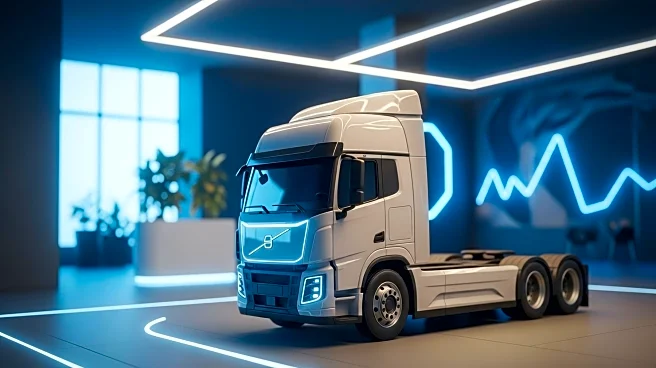What's Happening?
The electric truck market is experiencing significant growth globally, with China leading the charge in sales and infrastructure development. According to a report from BloombergNEF, zero-emission truck sales reached nearly 90,000 units globally in the first half of 2025, with China accounting for the majority of these sales. The European market is also expanding, while the U.S. market has seen a sharp decline due to recent policy changes. The report highlights that battery technology is the preferred choice for zero-emission trucks, capturing 97% of global sales. However, the U.S. market has been impacted by regulatory changes, including the Federal Trade Commission's actions that have forced truck manufacturers to retreat from agreements to comply with California's clean truck emissions rules.
Why It's Important?
The decline in electric truck sales in the U.S. has significant implications for the country's efforts to reduce carbon emissions and transition to cleaner transportation options. The policy reversals could hinder the growth of the electric truck market, affecting manufacturers, fleet operators, and the broader push towards sustainable transportation. As other countries continue to advance their electric truck initiatives, the U.S. risks falling behind in the global race for cleaner technology. This could impact the competitiveness of U.S. manufacturers and the country's ability to meet future emissions targets. The situation underscores the importance of consistent policy support to drive innovation and adoption in the electric vehicle sector.
What's Next?
The U.S. may need to reconsider its regulatory approach to support the growth of the electric truck market. State-level programs and corporate initiatives continue to show demand for electric trucks, with purchase vouchers available in states like California and New York. Additionally, the development of truck charging stations along major freight corridors is ongoing. These efforts could help mitigate the impact of federal policy changes and support the transition to electric trucks. Stakeholders, including manufacturers and environmental groups, may advocate for renewed policy support to align with global trends and ensure the U.S. remains competitive in the electric vehicle market.
Beyond the Headlines
The broader implications of the U.S. policy reversals on electric trucks extend to environmental and economic dimensions. The transition to electric trucks is not only about reducing emissions but also about economic benefits such as lower operating costs and reduced dependency on fossil fuels. The U.S. must balance these factors with regulatory decisions to ensure long-term sustainability and economic growth. The situation also highlights the need for a robust domestic supply chain for truck batteries, which is currently in its infancy. Building this infrastructure could be crucial for the U.S. to catch up with global leaders in electric truck adoption.











